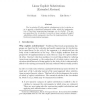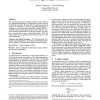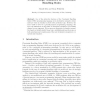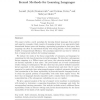11066 search results - page 128 / 2214 » Linearity in Process Languages |
135
Voted
IGPL
2000
15 years 2 months ago
2000
Abstract Neil Ghani Valeria de Paiva Eike Ritter The -calculus 1 adds explicit substitutions to the -calculus so as to provide a theoretical framework within which the implement...
107
Voted
PEPM
2009
ACM
15 years 11 months ago
2009
ACM
ract interpretation of programs relates the exact semantics of a programming language to an approximate semantics that can be effectively computed. We show that, by specifying ope...
124
Voted
CP
2005
Springer
15 years 4 months ago
2005
Springer
One of the attractive features of the Constraint Handling Rules (CHR) programming language is its declarative semantics where rules are read as formulae in first-order predicate l...
140
Voted
TCS
2008
15 years 2 months ago
2008
This paper studies a novel paradigm for learning formal languages from positive and negative examples which consists of mapping strings to an appropriate highdimensional feature s...
120
Voted
CDC
2008
IEEE
15 years 9 months ago
2008
IEEE
— Protein synthesis is an essential process of cell cycle and growth in eukaryotic cells. The initiation stage of the translation process is known to be the most crucial in regul...




